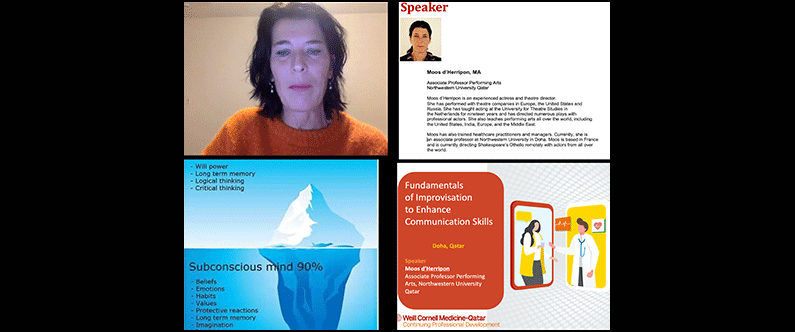WCM-Q learns about the lessons that actors can teach healthcare professionals
 Moos d’Herripon during the workshop
Moos d’Herripon during the workshop
Theatre and drama skills were brought into WCM-Q for a new workshop designed to help healthcare professionals enhance their communication strategies.
The one-day Fundamentals of Improvisation to Enhance Communication Skills online workshop was organized by the college’s Division of Continuing Professional Development and led by Moos d’Herripon, an associate professor of performing arts at Northwestern University in Qatar.
The aim was to show how techniques used by actors could also be used by healthcare professionals when communicating difficult or emotionally challenging news to patients, or when explaining complex issues. The class looked at how to use the pitch and tone of their voice with a voice training session, and also examined the importance of body language and its role in providing empathy.
The workshop was not about creating actors, but rather giving people the skills they need for life and medicine. Using improvisation techniques commonly used in the theatre allowed the healthcare professionals to explore issues like presence, vulnerability, truth and consciousness. The workshop also showed them how to pay greater attention to the way a patient reacts and how to adapt to change ‘in the moment’.
Deema Al-Sheikhly, director of medical education and continuing professional development at WCM-Q, said it had been an eye-opening workshop.
Ms Al-Sheikhly said: “One would imagine that the worlds of medicine and the theatre are almost diametrically opposed, one concerned with science, medicine and hard facts, and the other with the arts, emotions and the imagination. But medicine, of course, is one centered in humanity and healthcare professionals deal with the human side of medicine on a daily basis; hospitals are not research laboratories, they are places full of emotion, from joy to grief.
“This workshop really helped the participants to consciously think about the way they communicate, and gave them strategies and techniques for improving their communication skills, particularly in difficult situations and I would like to thank Moos for sharing her vast experience and knowledge with us.”